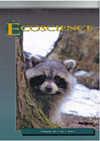泥炭地微生物群落的垂直分层遵循驼峰-空心微地形的功能类型梯度
IF 1.3
4区 环境科学与生态学
Q3 ECOLOGY
引用次数: 15
摘要
微生物在全球碳循环中起着至关重要的作用,特别是在储存大量碳的泥炭地生态系统中。北方泥炭地正受到商业开采泥炭、排水转化为林业和农业用地以及气候变化的压力。在这项研究中,我们确定了泥炭地深度剖面上的关键微生物群及其生态功能,并提供了与地下水位相关的环境变化如何改变微生物群落的见解。我们利用Illumina测序技术研究了微地形丘陵-空心梯度下原核生物群落的多样性和组成。群落种类和功能类群随深度呈梯度分布,丘层下层和洼地上层功能类群重叠。然而,总的来说,我们在洼地和小丘中发现了明显不同的原核生物群落。丘体表层以好氧化有机营养菌、甲烷化营养菌和化学异养菌为主,中深层以好氧化有机营养菌、固氮菌和厌氧硝酸盐还原剂为主,洼地深层以厌氧和兼性厌氧化有机营养菌、硝酸盐还原剂和产甲烷古菌为主。微生物组成作为水文和湿度制度的功能表明,改变水文制度的环境变化(例如,气候变化、泥炭地排水)可能改变碳和养分循环制度。本文章由计算机程序翻译,如有差异,请以英文原文为准。
Vertical Stratification of Peatland Microbial Communities Follows a Gradient of Functional Types across Hummock–Hollow Microtopographies
ABSTRACT Microbes play crucial roles in global carbon cycles, particularly in peatland ecosystems that store vast quantities of carbon. Boreal peatlands are under stress from commercial extraction of peat, drainage for conversion to forestry and agricultural lands, and climate change. In this study, we identify key microbial groups and their ecological functions across peatland depth profiles and provide insight into how environmental changes related to water table may alter microbial communities. We examined the diversity and composition of prokaryotic communities across a microtopographic hummock–hollow gradient using Illumina sequencing. Communities formed a gradient of species and functional groups with depth, with overlap in functional groups at lower layers of hummocks and upper layers of hollows. Yet, overall, we found significantly different prokaryotic communities in hollows than hummocks. Surfaces of hummocks were typified by aerobic chemoorganotrophs, methanotrophs and chemoheterotrophs, mid-depths were typified by aerobic chemoorganotrophs, nitrogen-fixing bacteria and anaerobic nitrate reducers, while lower depths in hollows were typified by anaerobic and facultative anaerobic chemoorganotrophs, nitrate reducers and methanogenic archaea. Microbial composition as a function of hydrology and moisture regimes suggests that environmental changes that alter hydrological regimes (e.g., climate change, peatland draining) may alter carbon and nutrient cycling regimes.
求助全文
通过发布文献求助,成功后即可免费获取论文全文。
去求助
来源期刊

Ecoscience
环境科学-生态学
CiteScore
2.80
自引率
0.00%
发文量
13
审稿时长
>36 weeks
期刊介绍:
Écoscience, is a multidisciplinary journal that covers all aspects of ecology. The journal welcomes submissions in English or French and publishes original work focusing on patterns and processes at various temporal and spatial scales across different levels of biological organization. Articles include original research, brief communications and reviews.
 求助内容:
求助内容: 应助结果提醒方式:
应助结果提醒方式:


